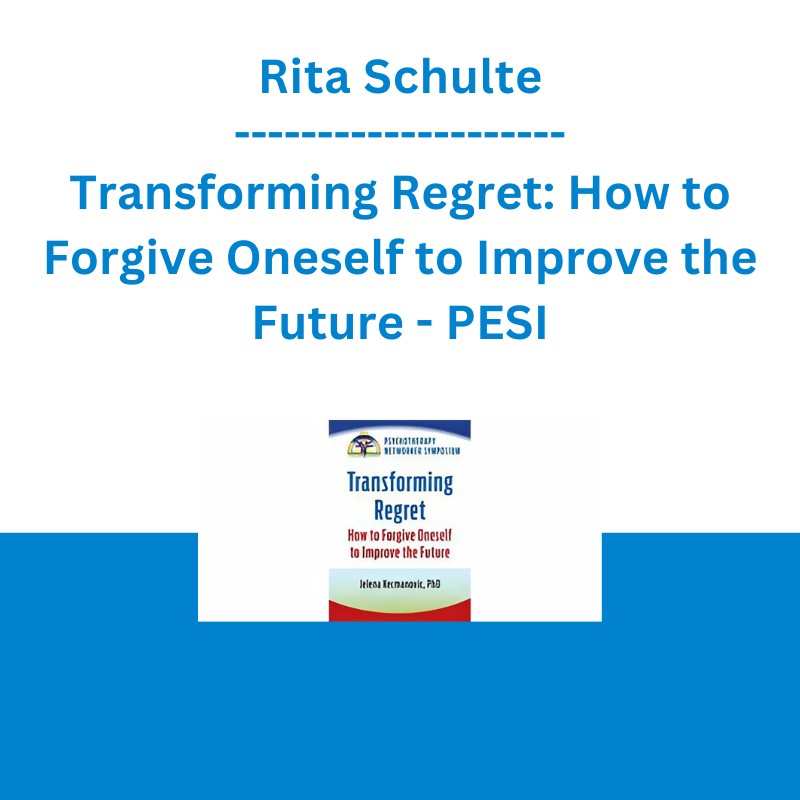*** Proof of Product ***
Exploring the Essential Features of “Rita Schulte – Transforming Regret: How to Forgive Oneself to Improve the Future – PESI”
Transforming Regret: How to Forgive Oneself to Improve the Future
Speaker: Jelena Kecmanovic, PhD
Duration: 2 Hours 06 Minutes
Description
People talk about regret more than any other emotion except love. And these days, ever-increasing choice, speed of technology, and social-media shaming have all made us particularly prone to regret. When it spirals into shame, rumination, and intense self-criticism, it can lead to depression, anxiety, sleep problems, and avoidance. By helping clients respond constructively to regret, they’ll be able to leverage it to improve their lives. You’ll discover how to:
- Increase self-compassion using meditation, guided imagery, somatic techniques, and expressive writing
- Improve emotional awareness and reduce rumination by expanding emotional vocabulary, differentiating emotions, locating them in the body, and enacting them
- Stimulate radical acceptance of both feelings and reality, and identify common thinking traps involved in regret to boost flexibility
- Use regret to clarify what’s important in life, make amends, and improve future actions
Speaker
Jelena Kecmanovic, PhD
Jelena Kecmanovic, PhD, is a clinical psychologist, the founding director of the Arlington/DC Behavior Therapy Institute, and an adjunct professor at Georgetown University. She’s a frequent contributor to The Washington Post and other popular outlets.
Speaker Disclosures:
Financial: Dr. Jelena Kecmanovic is the founding director and a clinical psychologist at the Arlington/DC Behavior Therapy Institute (ABTI). She is an adjunct professor at Georgetown University, and she receives royalties as a published author. Dr. Kecmanovic receives a speaking honorarium from PESI, Inc. She has no relevant financial relationships with ineligible organizations.
Non-financial: Dr. Jelena Kecmanovic has no relevant non-financial relationships.
Objectives
- Determine when regret becomes problematic leading to mental distress.
- Use meditation, guided imagery, somatic techniques, and expressive writing to engender self-compassion.
- Practice expanding emotional vocabulary, differentiating emotions, locating them in the body, and enacting them to improve emotional awareness and reduce rumination.
- Determine 4 practical interventions for working with both feelings and reality, and identify common thinking traps involved in regret to boost flexibility.
- Demonstrate interventions designed to leverage the experience of regret to clarify client values improve future actions.
Outline
- Identify when regret becomes preservative and counterproductive
- Engender self-compassion by using meditation, guided imagery, somatic techniques, and expressive writing
- Improve emotional awareness and reduce rumination by expanding emotional vocabulary, differentiating emotions, locating them in the body, and enacting them
- Stimulate radical acceptance of both feelings and reality, and identify common thinking traps involved in regret to boost flexibility
- Leverage regret to clarify what’s important in life, make amends, and improve future actions
Target Audience
- Psychologists
- Physicians
- Addiction Counselors
- Counselors
- Social Workers
- Marriage & Family Therapists
- Nurses
- Other Behavioral Health Professionals
Please see the full list of alternative group-buy courses available here: https://lunacourse.com/shop/










 Forexmentor - Recurring Forex Patterns
Forexmentor - Recurring Forex Patterns  Greg Loehr - Advanced Option Trading With Broken Wing Butterflies
Greg Loehr - Advanced Option Trading With Broken Wing Butterflies  Atlas API Training - API 570 Exam Prep Training Course
Atlas API Training - API 570 Exam Prep Training Course  SMB - Options Training
SMB - Options Training